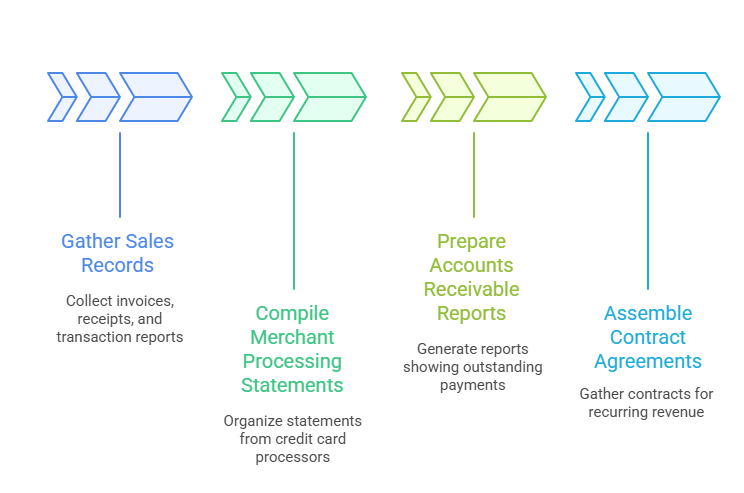Preparing your business before applying for funding can make the difference between approval and rejection. Many business owners rush into the application process without proper preparation, only to face delays or denials that could have been avoided. With lending standards evolving and competition for funding increasing, taking time to organize your financial documents, verify revenue streams, and create accurate cash flow forecasts has become more critical than ever. This comprehensive guide will walk you through the essential steps to maximize your chances of securing the funding your business needs to grow and thrive.
Financial Documentation Essentials
Financial documentation essentials form the foundation of any successful funding application. Lenders need clear evidence of your business's financial health and stability before they'll consider extending financing.
- Tax returns for the past two to three years, including both personal and business returns to show complete financial picture
- Bank statements from the last six to twelve months demonstrating consistent cash flow and account management
- Profit and loss statements that clearly outline your revenue streams, expenses, and net income over recent periods
- Balance sheets showing your business assets, liabilities, and equity to establish overall financial position
Revenue Verification Requirements
Revenue verification requirements vary among lenders, but having comprehensive proof of your income streams ready can streamline the application process significantly.

- Sales records including invoices, receipts, and transaction reports that validate your claimed revenue figures
- Merchant processing statements from credit card processors showing actual payment volumes and trends
- Accounts receivable aging reports to demonstrate outstanding payments and collection patterns
- Contract agreements for recurring revenue or major client relationships that provide income stability
Business Plan and Operational Documents
Business plan and operational documents help lenders understand your company's direction and management capabilities, which directly impacts their funding decisions.

- Current business plan outlining your company's goals, market analysis, and growth strategies for the next three to five years
- Organizational structure documents including ownership percentages, key personnel information, and management experience
- Industry analysis and competitive positioning to show market awareness and strategic thinking
- Legal documents such as business licenses, permits, and articles of incorporation proving legitimate operations
Creating Accurate Cash Flow Forecasts
Creating accurate cash flow forecasts demonstrates your ability to manage finances and repay funding responsibly, which lenders consider essential for approval decisions.
- Analyze historical patterns: Review past 12-24 months of cash flow data to identify seasonal trends, growth patterns, and recurring expenses that will impact future projections.
- Project monthly inflows: Estimate expected revenue from existing customers, new business opportunities, and any seasonal fluctuations based on your business model and market conditions.
- Calculate fixed and variable costs: Include all recurring expenses like rent, utilities, payroll, and insurance, plus variable costs that change with business volume or seasonal factors.
- Build in contingency buffers: Add reasonable safety margins for unexpected expenses or revenue shortfalls to show realistic planning and risk management awareness.
Improving Your Credit Profile
Improving your credit profile takes time but can significantly impact your funding options and terms, making this preparation step crucial for long-term financial success.
- Review credit reports thoroughly: Obtain reports from major credit bureaus for both personal and business credit, checking for errors, outdated information, or discrepancies that need correction.
- Pay down existing debts: Reduce outstanding balances on credit cards and other revolving accounts to improve your debt-to-income ratio and demonstrate financial responsibility.
- Establish business credit lines: Open accounts with suppliers or vendors that report to business credit bureaus, helping build a separate credit profile for your company.
- Make payments consistently: Ensure all bills, including utilities, rent, and existing financing payments, are made on time to establish a positive payment history.
Strategic Preparation Pays Off
Strategic preparation pays off by positioning your business as a lower-risk investment for lenders and increasing your negotiating power during the funding process. When you've organized comprehensive documentation, verified your revenue streams, and created realistic financial projections, you're demonstrating the kind of business acumen that lenders value. This preparation often leads to faster approval times, better terms, and access to a wider range of funding options. Remember that lenders are looking for businesses they can trust to repay financing responsibly, and thorough preparation shows you're serious about your financial obligations and growth plans.
Preparing your business before applying for funding requires time and effort, but the investment pays significant dividends in improved approval odds and better financing terms. By organizing your financial documentation, verifying revenue streams, creating accurate cash flow forecasts, and strengthening your credit profile, you're setting your business up for funding success. Remember that different funding options may have varying requirements, so staying informed about current trends and tailoring your preparation to specific lenders can further improve your chances. Take the time to prepare thoroughly, and you'll be ready to present your business in the best possible light when the right funding opportunity comes along.

.png)






